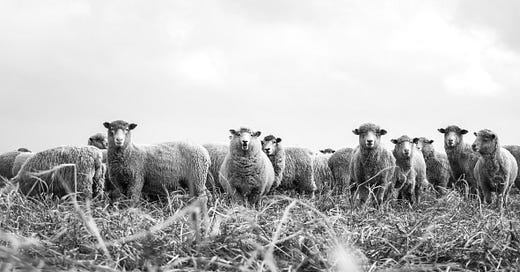A Sheepish Shepherd
Sometimes I feel like an extremely sheepish shepherd. Let me explain.
I’m both a shepherd and a sheep. I’m a pastor, but I desperately need pastoral care from Jesus and others.
I am a shepherd.
The term pastor or shepherd highlights some of the main duties and dispositions of a New Testament church leader. Pastors lead and feed the flock of God through prayer and the Word. They tend to the sheep who are hurting and wayward. Pastors defend the flock from false doctrine or enemies. These are the core duties of every pastor’s job description. I can’t imagine doing anything else, but there are also days where these things feel absolutely impossible. While I haven’t been a pastor for very long, I’ve quickly learned that there are seasons of pastoral ministry (i.e. 2020-21) that are really, really hard. On paper, the calling stays the same, but sometimes it’s like gracefully pulling your luggage along the moving sidewalk in the airport verses hauling it up a downward escalator. This past year or so has been an escalator kind of season. One of the main things it’s taught me is just how sheepish I continue to be.
I am a sheep.
When I say I’m sheepish, I don’t mean embarrassed or ashamed. Though I do plenty to embarrass myself, that’s not what I mean. I mean that I’m sheep-like. The metaphor for God’s people being sheep isn’t all that flattering. Sheep aren’t particularly intelligent. They’re certainly not capable of much independence. They wander easily and often. And they smell pretty bad too. In a nutshell, that’s how I often feel in pastoral ministry (though I do what I can about the smelly part). There are days when I look in the mirror and my sheep ears are rather prominent, and my shepherd’s cloak is odd fitting. I’m sure a lot of it has to do with my own sinful self-pity and self-focus, but it’s definitely become more noticeable this past year. My impulse is to fight that feeling by doing more and more shepherd-like things. I meet with more people. I schedule more meetings. I take on more ministry initiatives. But I’m convinced that the more I do this, the less effective I am as a shepherd.
I think pastors lead best when we remember we’re first and foremost sheep ourselves. I certainly don’t want to diminish pastoral duties or care, but the more I pastor as a sheep, the more I’m able to pastor sheep. People generally don’t open up to the guy who has it all together, but maybe they’ll trust the one who’s been through (or is going through) what they are experiencing. I think good shepherds end up speaking more sheep words than human words. This is how sheep learn the voice of their shepherds. Jesus described himself as “gently and lowly in heart” (Matt. 11:29). That means that Jesus was approachable. Jesus wasn’t rough or impatient. Jesus was easy to talk to and quick to listen. Why? Because, in a very real sense, he was one of us. He experienced pain and joy, disappointment and delight. He took on human flesh. He became sheep-like, and that’s part of what makes Jesus such a good shepherd.
I’m finally starting to learn that to grow as a pastor, it’s not by doing more and more pastoral things. It’s not about hiding my sheepy ears or trying to speak without a “baa”. In fact, more oft than not, it’s the opposite. The strength of Jesus shines most brightly in my weakness. I speak about the grace and mercy of Jesus most sweetly when I realize just how desperately I need it myself. I’m learning that in God’s economy, my sheepishness does not disqualify from pastoring. In fact, it might be the only thing that keeps me qualified.
Like I said, sometimes I feel like a sheepish shepherd, but I’m learning to lean into that instead of hiding it all the time. Feeling weak and needy doesn’t necessarily make me a good pastor, but feeling strong and independent will most certainly make me a bad one. At my best, I’m a sheep wearing a shepherd’s cloak helping people find the real thing in Jesus. I lead people to Jesus most effectively when I can say, “I need to go to Jesus too. Let’s go together.” In the end, there’s only one Good Shepherd, and it ain’t me. God uses sheep to care for sheep.



